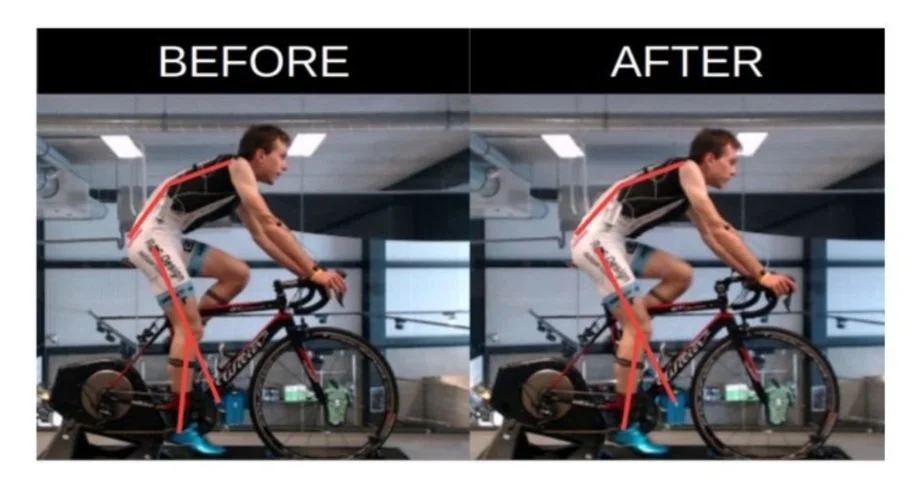Dr. Jeremy Grooves and the two bicycles used in his study, with the steel frame bike on the left and the carbon frame bike on the right. (Image Source: Grooves 2010)
“Light weight wheels accelerate faster than heavy ones, which helps when you’re taking off from a stop, but heavy wheels maintain more of their momentum than light wheels, which helps you keep your speed on rolling roads and trails. ”
A popular cycling expression is:
"A pound off the wheels is worth two off the frame”
However, is this expression true; will lighter wheels make you faster?
Lighter wheels speed up quicker so you can accelerate faster than heavier wheels
Lighter wheels also de-accelerate faster so they don’t hold their momentum as well over rolling terrain or trail obstacles
Heavier wheels spin for longer
Wheels store kinetic energy so heavier wheels will take longer to speed up but they hold their momentum longer, which takes them longer to slow down
Total bicycle weight + rider weight, including gear (water, keys, phone, spare tube, etc) is significantly more important than wheel rotational weight since wheels store kinetic energy with heavier wheels spinning for a longer duration.
The only time energy is lost during bicycling is during braking. While lighter wheels accelerate quicker they also slow down faster.
Bicycle wheels & power losses
Wheels account for nearly 10% of the total power required to propel your bike forward.
Wheel performance is effected by 3 main factors (on flat ground):
Wheel drag = 8% of total power loss
Wheel drag is the dominant factor in wheel performance and is responsible for nearly 10% of total aerodynamic drag
Wheel mass = 1% of power loss
Wheel mass or what some would call wheel weight is almost 10 times less significant than wheel aerodynamics
Wheel inertia = .5% of power loss
Rotating weight is nearly 100 times less significant than wheel drag
What this means is that a heavier wheel that is more aerodynamic will be significantly faster overall than a lighter wheel that has more wheel drag.
Rotating wheel weight = no difference
Rotating wheel weight makes nearly no difference at all. Why is this so?
Energy Losses Only Come From Braking
Rotating weight only comes into play during accelerations or de-accelerations. Lighter wheels speed up quicker, but they also slow down faster compared to heavier wheels, which speeds up slower but carries speed longer.
Lighter wheels & climbing
Riding at a constant speed there is no change in the inertia. While it’s easier to climb the lighter your bike is, it makes no difference where the weight savings comes from - - - you, your bike, gear, or your wheels.
Bicycle weight & commuting study
“It’s not about the bike””
In 2010, Dr.Jeremy Groves conducted a self-experiment where he commuted 27 miles (43.5km) round-trip to work on either his carbon frame bicycle or his old steel framed bike:
Steel frame bicycle total weight = 29.75lbs (13.5 kg)
Carbon frame bike total weight = 20.9 lbs (9.5kg)
Total vertical = 2766 feet (843 m)
Flat pedals for both bicycles
In addition to the steel bicycle weighing almost 9 lbs (4kg) more, the rim plus tire weight was over one-pound (453grams) heavier, per each total wheel.
So what bike was faster?
The steel-framed bicycle was slightly faster than the carbon fiber bike that was nearly 9 pounds lighter including over 2 pounds lighter in total wheel weight.
Front rims from Dr. Jeremy Grooves
Steel framed bicycle
30 rides
809 miles (1302 km)
Top speed = 36 mph (58 kph)
Same top speed for both
Fastest ride = 1 hour 37 minutes and 40 seconds
Slowest ride = 1 hour 57 minutes and 44 seconds
Average time = 1 hour 47 minutes and 48 seconds
Average speed = 15.02 mph
Carbon framed bicycled
26 rides
711 miles (1144 km)
Top speed = 36 mph (58 kph)
Same top speed for both
Fastest ride = 1 hour 40 minutes and 50 seconds
Slowest ride = 2 hours 3 minutes and 20 seconds
Average time = 1 hour 48 minutes and 21 seconds
Average speed = 14.95 mph
Average Speed: Carbon frame vs Steel frame
While this is just one example from one study, these results are typical of what has been known since the 1970s. For every 12 pounds gained or lost, there is a 1 mile per hour difference in speed (1.6kph), regardless of where the weight comes from.
In this particular study, Dr. Grooves was more comfortable on his steel framed bicycle. For recreational riding or bicycling commuting, comfort and bikefit are more important than weight, especially wheel weight.
Total bicycle weight & performance
Total bicycle weight, along with total rider weight, is the most dominant factor as opposed to where the weight actually comes from.
Heavier bikes are slower uphills but faster down them
Lighter wheels speed up quicker but also slow down quicker
Lighter wheels are less durable. Fixing a flat tire is 1,000% slower than even the slowest bicycle
Final thought
Carbon rims look faster, and for some, that is everything. However, unless you are constantly accelerating then braking, lighter wheels won’t make you faster.
The only time that energy is lost is from braking, so the extra energy that it takes to propel heavier wheels will be stored. This stored energy allows the wheels to spin longer, which is great for riding rolling hills or terrain with trail obstacles.
Jesse is the Director of Pedal Chile and lives in La Patagonia. Jesse has a Master of Science in Health and Human Performance and a Bachelor of Science in Kinesiology. Hobbies: Mountain biking, bicycle commuting, reading, snowboarding, researching, and sampling yummy craft beers.
Sources for “Will Lighter Wheels Make You Faster?”
Anhalt, Tom. “Why Wheel Aerodynamics Can Outweigh Wheel Weight and Inertia.” Slowtwitch.com, 31 May 2011, www.slowtwitch.com/Tech/Why_Wheel_Aerodynamics_Can_Outweigh_Wheel_Weight_and_Inertia_2106.html.
Armstrong, L. (2000) It’s Not About the Bike: My Journey Back to Life. London: Yellow Jersey.
GCN Tech. “Why Rotating Weight Doesn’t Matter On Your Road Bike | GCN Tech Debunk A Common Cycling Myth.” YouTube, 12 July 2020, www.youtube.com/watch?v=0QDnUkUaQfk.
Glaskin, Max. Cycling Science: How Rider and Machine Work Together. Illustrated, University of Chicago Press, 2012.
Glaskin, Max. Cycling Science: How Rider and Machine Work Together. Illustrated, University of Chicago Press, 2018.
Groves, J. (2010). Bicycle weight and commuting time: randomised trial. BMJ, 341(dec09 2), pp.c6801–c6801.
Willett, Kraig. “| ‘An Ounce off the Wheels Is Worth a Pound off the Frame’: Is Rotational Weight Crucial?” CapoVelo.com, 12 Mar. 2020, capovelo.com/ounce-off-wheels-worth-pound-off-frame-rotational-weight-crucial/.















